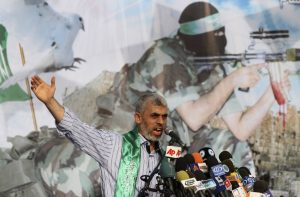Yahya Sinwar: The Hamas Leader Killed in Gaza
On October 17, 2024, Israeli forces reportedly killed Yahya Sinwar, a prominent leader of Hamas, during a military operation in Gaza. This event marks a significant moment in the ongoing conflict between Israel and Hamas. Since the October 7 attacks, tensions have escalated, leading to heavy casualties on both sides. Sinwar’s death could reshape Hamas’s future and alter the dynamics of the region.
Who Was Yahya Sinwar?
Yahya Sinwar was born in 1962 in a refugee camp in Khan Younis, Gaza. He faced hardship and displacement early in life. These experiences fueled his commitment to the Palestinian cause. Sinwar joined Hamas shortly after its founding in 1987 and quickly gained a reputation for his hardline stance against Israel.
Rise to Power
Sinwar faced challenges as he climbed the ranks of Hamas. In 1988, Israeli forces arrested him for his involvement in violent acts against Palestinians accused of collaborating with Israel. He spent over two decades in prison, where he learned Hebrew and gained insights into Israeli society.
After his release in a prisoner exchange in 2011, Sinwar returned to Gaza and rapidly ascended within Hamas. He became known for his strategic planning and brutal tactics. In August 2023, he took over as the head of Hamas’s political bureau after Israeli forces killed Ismail Haniyeh.
The October 7 Attack
Sinwar played a key role in planning the October 7 assault on Israel. This attack resulted in approximately 1,200 Israeli deaths and sparked a fierce military response from Israel. The violence marked a significant escalation and led to widespread devastation in Gaza, with over 42,000 Palestinian lives lost since then.
The Impact of His Death
The Israeli military confirmed Sinwar’s death as a major victory against Hamas. Israeli officials described him as a “terrorist mastermind,” responsible for orchestrating violence against civilians. His elimination may complicate efforts to negotiate hostage releases and shift power dynamics within Hamas.
Reactions to Sinwar’s Death
Following news of his death, reactions varied widely. Many Israelis viewed it as a long-awaited success against a significant threat. Conversely, among Palestinians and supporters of Hamas, his death symbolized martyrdom that could inspire further resistance against Israeli actions.
The Future of Hamas
With Sinwar gone, questions arise about who will lead Hamas next. Potential successors include his younger brother Mohammed Sinwar and Khaled Meshaal, both experienced figures within the organization. Analysts suggest that while Hamas has shown resilience after leadership losses before, unique challenges remain due to recent targeted killings within its ranks.
Ceasefire Negotiations
Sinwar’s hardline approach often delayed ceasefire negotiations with Israel. His absence may allow new leadership to pursue different strategies regarding peace talks and hostage negotiations. However, ongoing violence and instability make it uncertain how this will unfold.
The killing of Yahya Sinwar represents a significant turning point in the conflict between Israel and Hamas. As both sides assess the implications of this event, it is clear that the struggle for power and control over Gaza will continue. The future remains uncertain for both Hamas and the broader Palestinian cause as they navigate this new landscape without one of their most prominent leaders.


